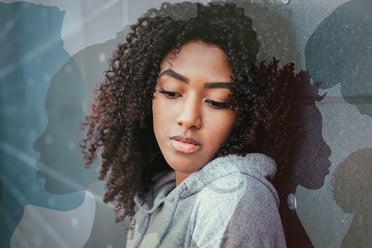Legacy Burdens: What We Inherit from Our Ancestors

Humans are complicated. We all have unique strengths and challenges. We are shaped by our environment, our circumstances, and our communities.
We also inherit things from our families and ancestors, many of which are out of our control. Our DNA contains multiple markers for skin and eye color, height, and other physical traits. Personality, culture, and beliefs are also often passed down by our parents, grandparents, and great-grandparents.
We can inherit positive beliefs and traits: good humor, resilience, strength. These are gifts we may seek to nourish and pass along to the next generation.
However, because our ancestors survived some difficult experiences, we also can inherit qualities that aren’t so helpful.
These are called “legacy burdens.” Learning to recognize them and move past them can allow us to live more fully and pass along a more positive legacy.
What Are Legacy Burdens?
Caitlin Capitstran, DPT, describes several beliefs that would be considered legacy burdens, such as:
- “Resources are scarce; I won’t have enough.”
- “Other people will hurt me.”
- “It’s not safe to be who I am.”
When these types of mindsets are passed on in families, they can lead to a number of issues. Even if you don’t experience scarcity, for example, you may live with a constant fear of not having your basic needs met.
If you expect others to hurt you, you will exist in a constant fight-or-flight mode. And believing it is not safe to be yourself because of inherited, internalized racism or homophobia is a heavy burden to carry.
Other examples of legacy burdens could include having difficulty showing affection or being vulnerable, hiding your imperfections for fear of judgment, speaking up for yourself, or deviating from "the norm" in sexuality and gender identification.
A therapeutic approach called Internal Family Systems (IFS) is moving people toward liberation from these limiting beliefs.
Internal Family Systems
In 2000, Richard Schwartz, Ph.D., author of No Bad Parts, founded the Center for Self Leadership—now called the IFS Institute. The IFS Institute is a training and educational hub for a branch of psychotherapy based on the belief that we have the capacity to heal ourselves.
The IFS Institute describes the approach as “a transformative, evidence-based psychotherapy that helps people heal by accessing and loving their protective and wounded inner parts. We believe the mind is naturally multiple and that is a good thing. Just like members of a family, inner parts are forced from their valuable states into extreme roles within us. We also all have a core Self.”
According to IFS, that self cannot be harmed, and it knows how to heal.
Considering Legacy Burdens in Practice
Fai Monaghan, a practitioner trained in EMDR and IFS techniques, calls legacy burdens “intergenerational transmissions of extreme feelings, emotions, energies, and beliefs.”
She emphasizes that these burdens are not always transmitted knowingly. Anything that previous generations considered unacceptable or shameful can make its way into our unconscious.
Examples are shame, rage, anxiety, fear, perfectionism, and hopelessness.
Clinicians can use trauma-informed practices to ferret out some of these legacy burdens as they help clients better understand and unburden themselves from unhelpful inherited issues.
Legacy Burden Check-in
Monaghan presents a simple reflection check-in, credited to Ann Sinko, LMFT, to get the process started:
- Are parts of you holding on to something that doesn’t belong to you?
- Who else in your family carries parts that hold these symptoms: anxiety, anger, shame, fear, grief, perfectionism?
- Does this energy belong to you alone?
Another Burden to Consider: Cultural Trauma
Black Americans face specific legacy burdens connected to the intergenerational trauma of slavery, discrimination, violence, and racism.
When it comes to examining those legacies, we seek the wisdom of Deran Young, LCSW, MPA, and founder of Black Therapists Rock. Young was a keynote presenter at the Connecticut Women’s Consortium’s 2022 Trauma & Recovery Conference.
The Black Therapists Rock website states that approximately 87% of Black Americans believe racism is a very serious or serious problem, and that PTSD rates in the Black community are 40% higher than among whites and Latinos.
In addition to founding Black Therapists Rock, Young has worked around the world to connect the issues of social justice, cultural identity, and culturally relevant therapeutic approaches. She teaches a course with the IFS Institute called “Healing Cultural Trauma with Internal Family Systems (IFS).”
Moving Toward a More Equitable System
When behavioral health professionals become aware of their own biases and approach their practice with a sense of cultural humility, they can open the door to frank discussions of legacy burdens and intergenerational trauma.
These actions move us closer to the world we want to see: where individuals are able to express and pass along all the positive strengths from their families and ancestors while shedding the excess baggage of legacy burdens.
Subscribe for updates
_.webp)



